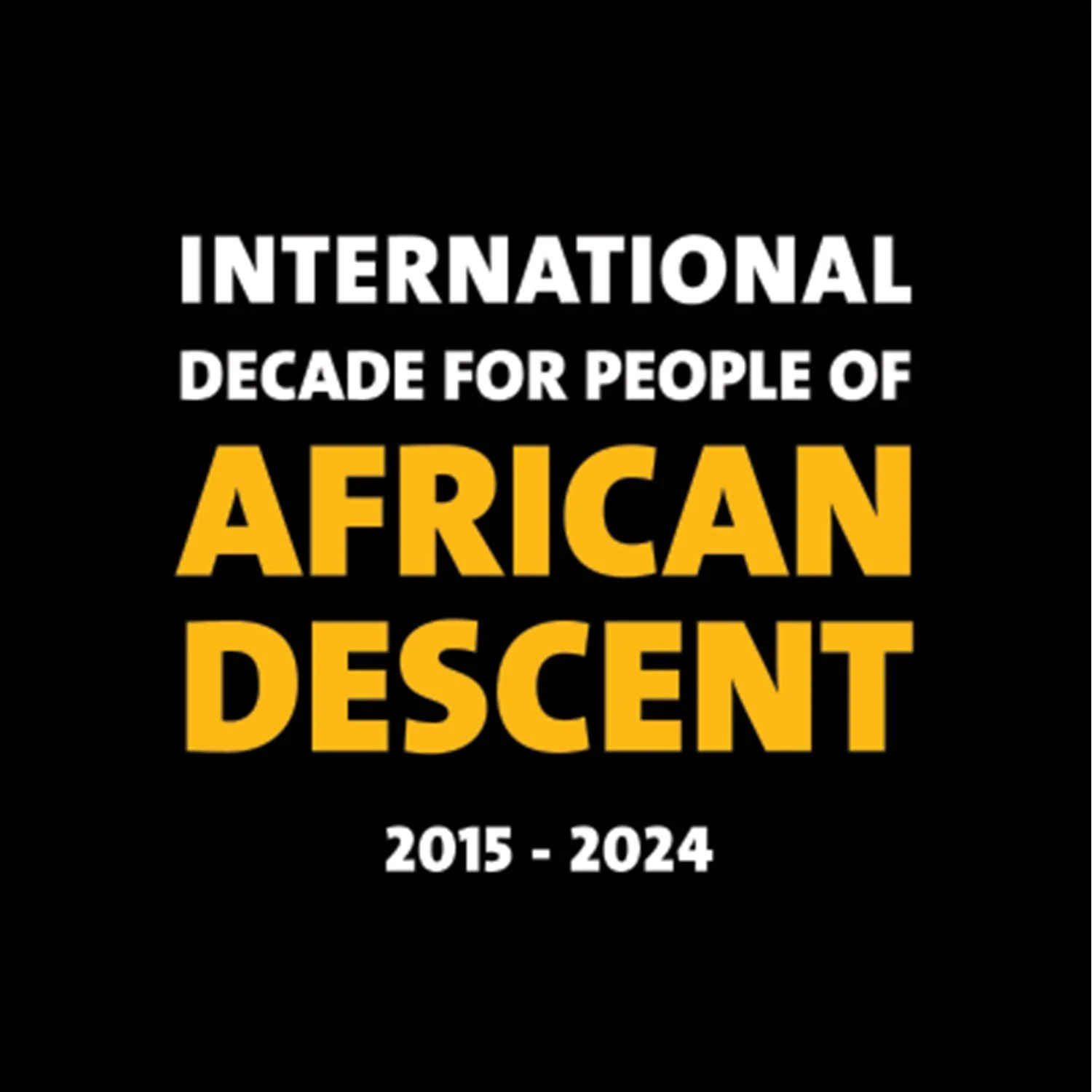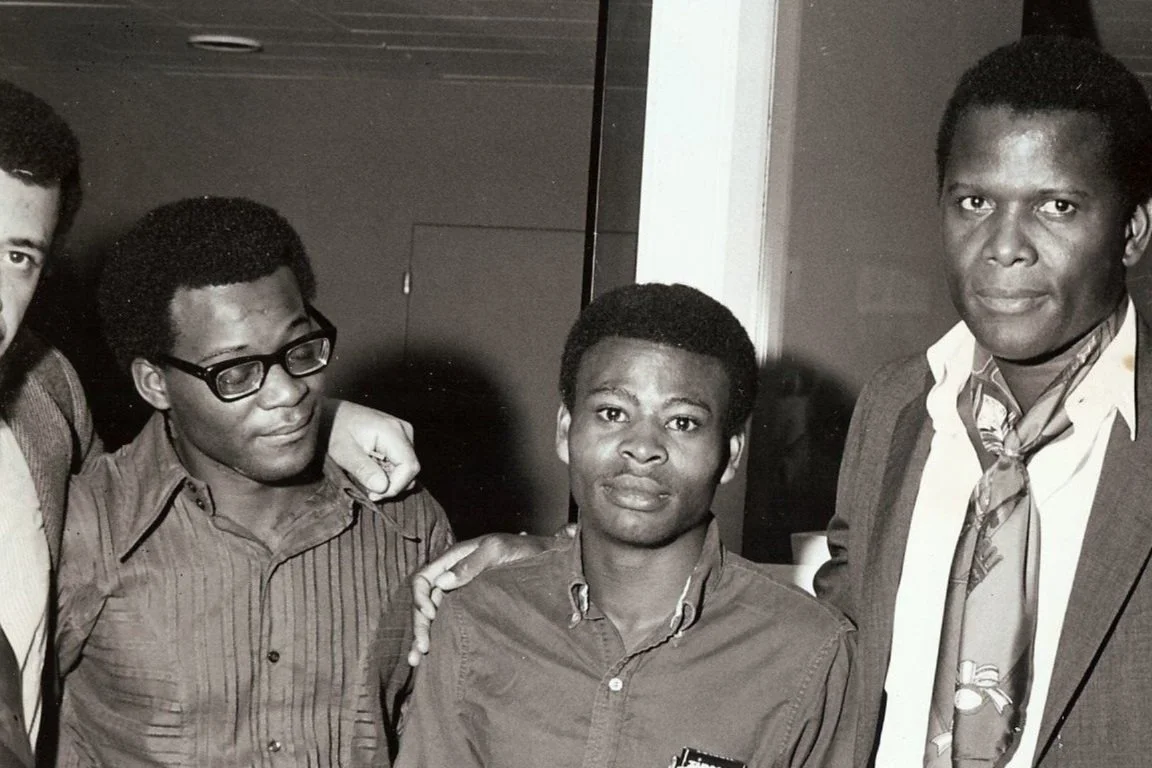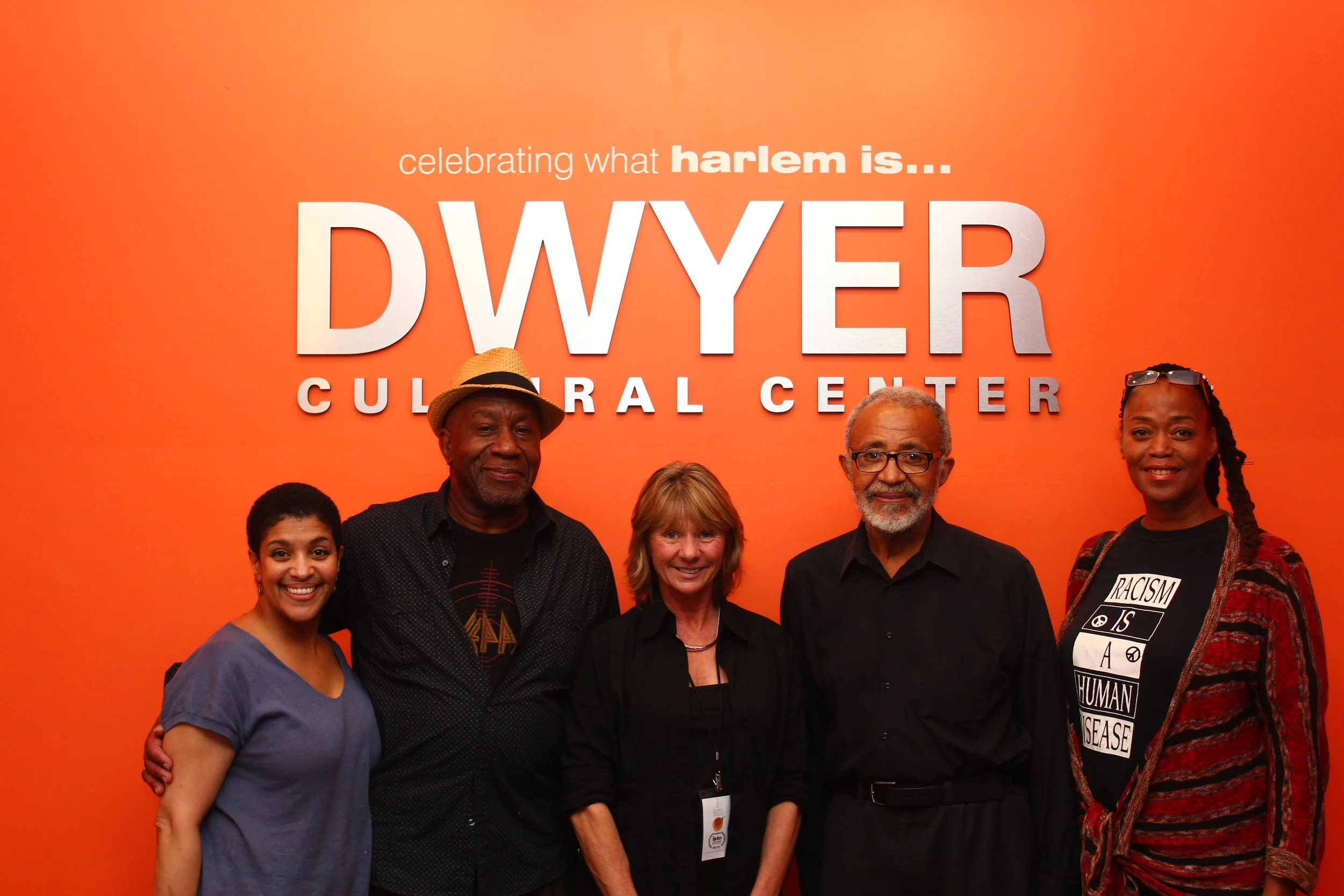SIDNEY POITIER, OSSIE DAVIS, RUBY DEE, Cliff Frazier, Rita Moreno, HARRY BELAFONTE & Piri ThomasPatron Saints of Hollywood
United Nations Exhibition - September 21, 2024
This exhibition is organized under the framework of the United Nations International Decade for People of African Descent (2015-2024), a resolution that underscores the valuable contributions African descendants have made to our societies,
This exhibition pays homage to Cliff Frazier and his esteemed colleagues, Sidney Poitier, Ossie Davis, Ruby Dee, Harry Belafonte, Piri Thomas, Rita Moreno, and countless others for their invaluable contributions to black cinema, both on screen and behind the scenes. These individuals trained and mentored a generation of Black and Latino filmmakers in the aftermath of the 1968 riots sparked by Martin Luther King Jr.'s assassination, providing a constructive outlet for young adults to channel their emotions.
Cliff Frazier, seated alongside Ndaba Mandela, Nelson Mandela’s grandson, as a guest speaker at the 2018 SDG Media Summit during the "Black Is Beautiful" portion of the program, discussed the groundbreaking programs he helped develop in the 1970s and 1980s.
In December 2013, the UN General Assembly passed resolution 68/237, declaring 2015 to 2024 as the International Decade for People of African Descent. The resolution highlights the significance of this initiative as a timely opportunity to underline the valuable contributions made by people of African descent to our societies and to propose concrete measures to promote their full inclusion.
As the International Decade concludes, with the support of the New York Metropolitan Martin Luther King Jr. Center for Nonviolence and the World Council of Peoples for the United Nations, the American Skin exhibition, under the framework of this resolution, tells the history and spotlights the significant contributions, and a legacy not known to many, of Cliff Frazier and that of his esteemed colleagues, many of whom have left indelible marks on the global stage, including at the United Nations. Minerva Diaz, the visionary artist behind American Skin, will curate this history-telling exhibition to be showcased in 2025, accompanied by a panel discussion with those who lived the history.
In 1968, Cliff Frazier, a celebrated stage actor, and Sidney Poitier, an accomplished actor-producer and executive committee member of the American Film Institute (AFI), were at the height of their careers. That same year, following the assassination of Dr. Martin Luther King Jr., a wave of hurt, anger, and devastation, swept through over 100 cities across America, resulting in violent civil unrest and riots. These events left behind a trail of destruction in America's vibrant black communities, highlighting an urgent need for action.
Amidst the civil and social chaos, the founder of the American Film Institute, George Stevens Jr., turned to Sidney Poitier, who avidly supported Dr. Kings’ efforts and asked how he could help. Sidney proposed establishing film workshops in some of the devastated underserved communities nationwide, providing an outlet for young adults to channel their anger constructively. With the support of the AFI, an initial grant of $50,000 was allocated to establish the Community Film Workshop Council. Inspired by Dr. King's teachings, Cliff Frazier decided to pursue a more meaningful path and accepted Sidney Poitier's appointment as Executive Director, leaving his acting career behind and becoming the force that drove this initiative.
Shortly thereafter, luminaries such as Ossie Davis, Ruby Dee, Harry Belafonte, Piri Thomas, Rita Moreno, and many others, in addition to developing their striving careers took the time to support this initiative, marking the birth of the first film workshops dedicated to training and mentoring young minority filmmakers. The program received support from various sources, including government grants, private foundations, and contributions from individual and corporate donors like 20th Century Fox and Columbia Pictures. In 1969, 15 apprentices from the program were working, thanks to a $25,000 grant funded by the Ford Foundation, alongside experienced filmmakers at an East Harlem studio on the set of “Angel Levine,” a Harry Belafonte Enterprises Production.
Third World Cinema Productions (TWC) and the Institute of New Cinema Artists (INCA) were established two years later. Together these three organizations' impact extended beyond the camera lens, as they trained and placed over 2000 minorities from disadvantaged communities into various media industries, including motion pictures, TV, recording, and allied media, in roles such as directors, writers, producers, broadcast journalists, technicians, and management personnel across the United States and abroad.
In doing so, they helped restore a sense of pride to those who lived in some of those devastated communities following the 1968 riots. They addressed the lack of diversity and unrealistic portrayal of marginalized communities in cinema, and their workshops throughout the US and Puerto Rico provided employment opportunities and promoted both creative and economic justice. In many instances, the program alumni were the first minorities hired at local and national TV stations and their successes paved the way for many who followed.
CFWC, TWC, and INCA embodied the UN’s resolution’s recognition, justice, and development principles. They recognized a problem, developed a solution, and brought about a level of justice utilizing their craft and scope of practice. The program also aligned with the UN’s Sustainable Development Goals, #4 education, #5 gender equality, and #16 inclusive societies, long before these goals were established in 2015. These initiatives helped change the face of the broadcast industry and significantly impacted the motion picture and recording industries. They also developed film and television products that positively communicated the lifestyle and situations of the minority experience with films such as “Claudine”, a movie that helped shape Black cinema.
These trailblazers not only trained and mentored talents like Anette Powlis, Warrington Hudlin, Felipe Luciano, Preston Holmes, and Stanley Nelson but also paved the way for independent Black and Latino filmmakers such as Spike Lee, John Singleton, Ava DuVernay, Julie Dash, Luis Valdez, Gregory Nava, and countless others. Decades later, major production studios drew inspiration from these pioneering organizations, establishing their own workshops.
MLK Jr. joins Ossie and Ruby backstage after the 100th performance of Purlie Victorious in 1961MLK Jr., Harry, Asa Randolph, Sidney Poitier, circa 1960.On April 9, 1968, 50,000 mourners marched in Dr. Martin Luther King Jr's funeral processionCliff Frazier and Sidney Poitier with CFWC studentsRecording Industry training program studentsNYC Mayor Lindsay, Ruby Dee and Cliff Frazier CFWC graduationCliff Frazier, Sidney Lumet and Ossie DavisNellie Kemp CFWC studentCliff Frazier, Ruby Dee and Ossie Davis with recording industry training graduatesHarry Belafonte with CFWC studentsDiahann Carol and James Earl Jones with the rest of the cast of “Claudine”"Last month we received a letter from one of our graduates. It is quite touching and I would like to share part of it with you.
It reads:
Tonight is very special to me, having talked to you earlier about being unable to find quarters here in Miami and wondering about Saturday night and part of Sunday morning – feeling rather anxious about the rushes (news film) that I shot this morning and worried about whether I was in focus – and then I saw the film and it was crystal clear. They put it on the 6pm news. I felt so proud that I wished you were here. I wished everyone at CFWC (and believe me every one) were here… I feel so damn good, let me repeat “Thanks” because without CFWC and the American Film Institute, I probably wouldn’t be doing anything. The program helped me, for I feel I can stand beside anybody. Brothers believe me, it’s beautiful.
It was signed “Joe.” This letter makes all the sweating, frustration and pain worthwhile. It indicates that he has found a sense of self-worth, and that discovery is breathtaking”
Cliff Frazier
“My dearly beloved Husband, Ossie Davis, and I were very proud of the accomplishments of Third World Cinema, the Community Film Workshop Council, and the Institute of New Cinema Artists. For over thirty years we marveled at their accomplishments.”
Ruby Dee
Cliff Frazier, an Emmy award-winning producer who received an International Peace Award in Kobe, Japan in 2007, passed away on February 3, 2022. He not only played a vital role in shaping the history of these groundbreaking programs but also, alongside Justice Hansel L. McGee, founded the Harriet Tubman Charter School. This was the first charter awarded by the NYS Board of Regents in 2004.
Additionally, he co-founded the Dwyer Cultural Center in Harlem in 2008. Also, he served as the Executive Director of the NY Metropolitan Martin Luther King Jr. Center for Nonviolence (NYMLK), an NGO associated with the United Nations, where he was actively engaged.
Mr. Frazier's indelible leadership has profoundly impacted many lives in his community, across the country, and beyond. His legacy will undoubtedly continue to do so for years to come. Honoring him during the 2024 General Assembly, the year which marks the end of the International Decade for People of African descent, acknowledging their contributions to our societies is a fitting tribute to his enduring legacy.
Cliff Frazier, emmy award winnerCliff Frazier, exec dir of nymlk with UN colleaguesCliff Frazier, co-founder of the harriet tubman charter school Cliff Frazier, co-founder of the dwyer cc withwith colleagues and guests 
















